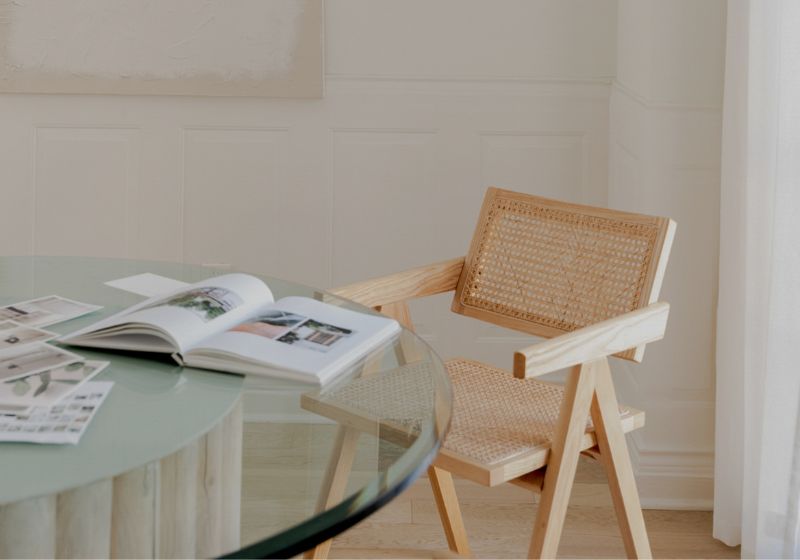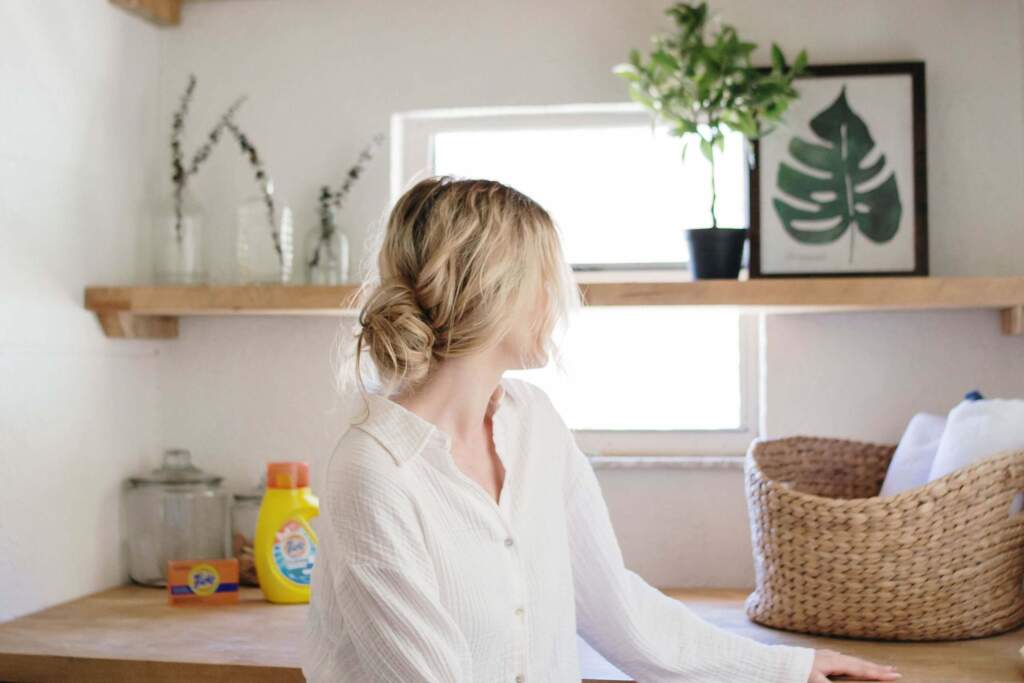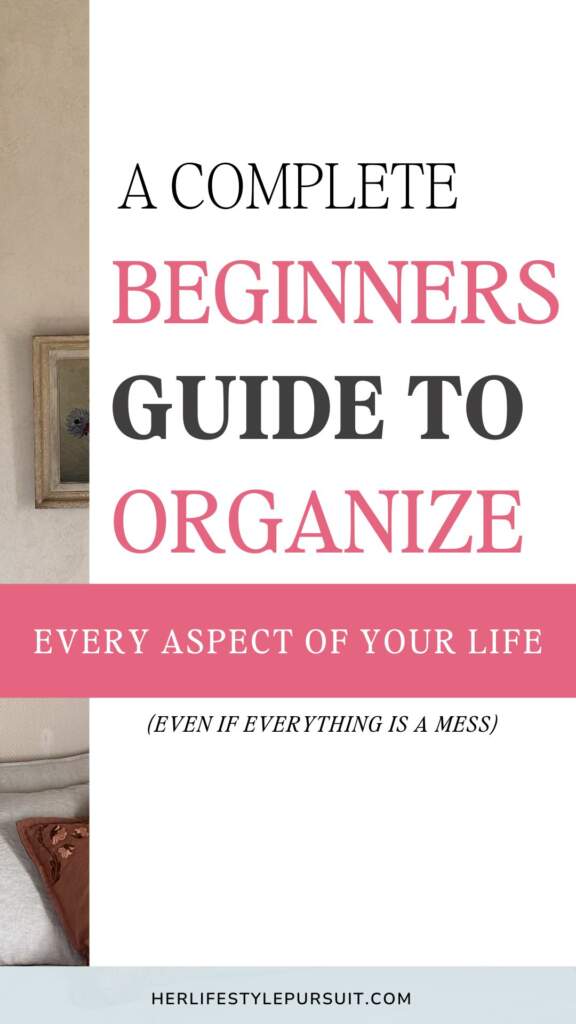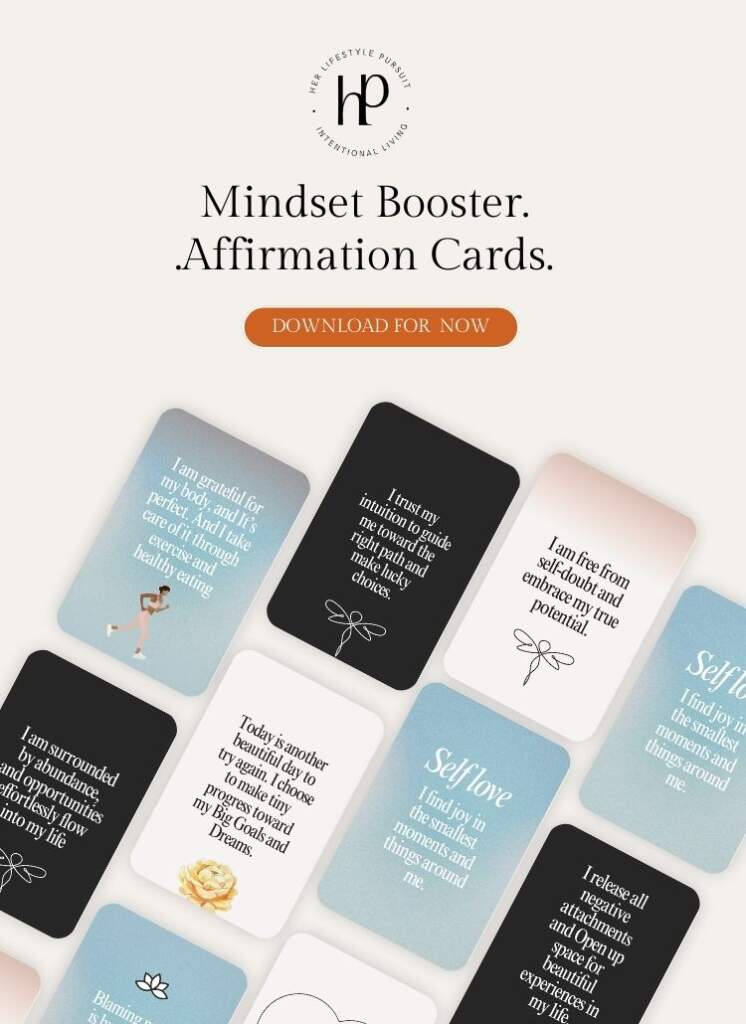Looking to learn how to organize your life? Here are 100 bite-sized tips to organize every aspect of your love and move from messy to organized.

Learning how to organize your life is essential to becoming productive and building a healthy lifestyle without chaos.
Sometimes, the thought of being organized may seem daunting, but learning how to organize your life benefits you.
Imagine waking up without a morning routine: you shower and head straight to work, and on your way to work, you buy junk for breakfast and snack on it.
Then you return in the evening to a scattered home, tip-toe around the messy house, and go straight to bed.
Relaxing in a calm ambiance in your home doesn’t exist for you because your closet, kitchen, toilet, bathroom, and bed are a mess.
Maybe yours isn’t your home; you find organizing your day-to-day work life challenging.
Your inbox is a mess with all those spammy messages, and you always struggle to meet deadlines.
No matter where you are or how messy your life seems, I understand it’s not entirely your fault; life and trying to survive always get in the way.
You need systems to help you organize your life, create a routine, and live better.
So, if you’re still on the fence about organizing life, because you feel it’s a lot of work. Don’t fret about it.
I have put together 100 ways to organize your life and take charge of how you live; most importantly, you don’t have to make drastic changes. It can take a few days to a month, even a year, to organize your life.
This post may contain affiliate links, which means I’ll receive a commission if you purchase through my link, at no extra cost to you. Kindly read the full disclosure here.
100 Ways to Organize Every Aspects of Your Life
I’ve broken down this blog post into 10 categories to organize your life, which includes your mental space, health, work life and workspace, digital life, home, self care, travel, food, and finance
Organize Your Mind and Mental Space
Organizing your mind and mental space positively impacts your overall life and well-being.
You can greatly improve your mental and emotional state by decluttering your thoughts, practicing self-reflection, prioritizing self-care, setting boundaries, creating a routine, simplifying your life, and being intentional.
When you organize your mind and mental space, you take control of your thoughts and emotions, creating a more positive and fulfilling life.
But how can you organize your mind and mental space without feeling overwhelmed or lost?

1. Start with Understanding your Strengths and Weaknesses
When learning how to organize your life, your strengths and weaknesses are the first to consider.
You must learn to use your strengths and weaknesses because what works for others may not work for you.
Assuming staying fit is part of your goals for the year, but you are like me, who exercising in the morning leaves you exhausted and unproductive.
To create a balance, I work out in the evening and accomplish other vital tasks in the morning. And this way, I’m not wasting my day.
Now, think about other strengths and weaknesses to create a fine balance, using one against the other.
The truth is that understanding your strengths and weaknesses can help you organize your life by allowing you to set realistic goals, avoid burnout, build better relationships, improve time management, and finally enhance your personal growth and self-awareness.
2. Practice Mindful and Intentional Journaling
Intentional journaling is a helpful tool for decluttering and organizing your headspace.
If you want to declutter your mind, practice intentional journaling, where you ask yourself deep and unraveling questions that can help you understand where you’re at and how to move forward.
Journaling is one of my fail-proof methods of discovering patterns and understanding myself better, and it eventually helps me organize my life.
With intentional journaling, you’ll find answers to deep questions, clarify your thoughts and goals, track your progress, reflect on your experiences, stay accountable, identify patterns, and, most importantly, reduce stress.
3. Create a Personal Development Plan
To accomplish anything tangible in life, you must have a goal and an action plan to back it up.
And the same goes for organizing your life. One effective way to organize your life is to set goals that you can use to measure your progress because progress is different for every individual.
For example, if your goal for creating systems to organize your life is to wake up early daily at 6 am.
Perhaps the other person’s goal is to organize her life to be more present and intentional with her family.
This means progress and how you measure your goals will be different.
Therefore, Setting a personal development plan helps you establish clear and specific goals, prioritize them, and create a roadmap for achieving them.
To create a personal development plan and organize your life;
- Identify your goals
- Create a timeline (a goal without a timeline is like a wish).
- Prioritize your goals
- Review your goals frequently and
- Track your goals
4. Avoid procrastination and Be intentional
Show me someone who procrastinates a lot, and I’ll show you a person who is stuck and never achieves her goals.
Let me put it this way: procrastination is the godmother of “failure”.
Have you ever set your to-do list and kept pushing it by an hour until you did it at the wrong time and eventually ended up disrupting or not accomplishing your other tasks for the day?
This is because you conditioned your mind to believe you have lots of time to accomplish a particular.
Also, this isn’t me judging you because I’ve been there.
Remember that “done is better than waiting to be perfect.”
If you procrastinate, set and accomplish your most important tasks for the day before proceeding to handle other tasks.
5. Embrace your Natural Inclinations
Embracing your natural inclination is essential to learning how to organize your life.
When you focus on tasks and activities you love and enjoy, you’ll likely be motivated and engaged, making it easier to stay organized and focused.
Just like understanding your strengths and weaknesses, embrace activities you love and finish them quickly.
When you accomplish a task, you become positive and fueled to take on the next task.
You’ll need to let go and trust yourself more.
6. Be disciplined
You must stay disciplined if you desire to build systems to organize your life.
Organizing your life is like changing a habit, and we know changing habits is always daunting and challenging.
You need to be patient with yourself and practice self-discipline.
Discipline helps you stay focused on your goals and prioritize your time effectively.
Therefore, use this blog post as a guide to outline the things you want to organize in your life, set a goal, and accomplish them.
How to Organize Your Life; Organize Your Time Effectively

7. Create Routines and Stick to Them
Routines are daily rituals that guide your daily actions and behaviors. Although, It’s one thing to create a routine and another to stick to it.
Our daily routines form our habits, which we repeatedly do.
One mistake people make when creating a routine is “trying to conquer all.”
Don’t try to conquer the world in a day, and your routine is not a wish list—being realistic about things you want to accomplish is vital.
Start with small, manageable routines. It could be a morning routine that involves a cup of coffee, some stretching, and a quick glance at your daily goals.
Doing this will help you organize everything about your life, manage your time, and stay productive.
I once had a messed up routine because I’d always jumped on any activity. Trust me, it didn’t end well. Not only did I have a disorganized life, I struggled to achieve my goals.
However, I tried to get my life together and created a clear morning, afternoon, and evening
routine, making things easy.
8. Write Everything Down
You don’t have to be a writer to simply put down everything (lol).
Writing down everything helps you capture your ideas, tasks, and goals so they don’t slip through the cracks.
It’s more like having a personal assistant who helps you prioritize your responsibilities. Note them down, whether it’s a to-do list, little reminders, grocery shopping lists, movie dates, birthdays, etc.
This is how to organize your life to stay on track and focus on what truly matters.
Now, get a sticky note, a notepad, and a pen. You can install a notepad on your phone and write things down.
9. Plan Ahead and Time Block
If you are planning how to get your life organized, plan.
Life sometimes goes differently than planned, and things change.
Yes! This fact cannot be disputed, but guess what?
Planning puts you at the top of your game when you want to organize everything about your life.
Plan your week or month, and most importantly, stick to the plan! After planning, don’t fail to create a time block on Google Calendar.
This will keep you alert and increase your productivity.
Let’s experiment; list everything you want and how to achieve them. This reduces stress when the actual day pops by.
10. Develop a Sleep Routine.
Yes, you read that right!
Setting a sleeping routine is a way to organize your life. It allows for quality sleep and a recharged mind. This gives room for readiness in approaching daily tasks.
Once the day’s activities are done, I take a warm bath, read a book, and meditate. It helps me fall asleep quickly and refreshes my mind and body.
I recommend reading Why We Sleep by Matthew Walker to understand everything about sleep.
11. Wake up early and start your day
To get your life organized, you must practice the art of waking up early.
Waking up early can be tough, I know. It’s usually tempting to hit the snooze button and get back wrapped in your comfy bed.
But what if I told you that rising early is a secret to organizing your life?
When you wake up early, you can plan your day, go about your morning routine, and achieve set tasks with focus and vigor.
12. Prioritize and Deprioritize Your Activities
When building systems to organize your life, you must prioritize and deprioritize.
This allows you to tackle urgent and important tasks, schedules, and responsibilities and perform them accordingly.
Declining unimportant tasks and prioritizing the urgent ones helps you serve your important goals and give full attention to what matters.
Consider activities that require less effort but yield more results and activities that waste your time but yield little effort, and prioritize accordingly.
13. Schedule Activities
Scheduling activities your daily activities at least a day before. When you schedule your activities early, it helps you organize your time.
Also, make the most out of your time by creating a well-structured plan for all tasks, commitments, and responsibilities and staying on it.
This helps you focus and achieve all important tasks without hassles.
You can use Google Calendar to schedule activities for free.
14. Organize Your Life With Project Management Tools
When thinking of how to organize your life, you can leverage some project management tools.
Trello, Asana, and Notion are my go-to apps.
These tools help me to plan, track, and manage projects effectively. Try using them. They work.
15. Track Your Time and Time You Spend on a Project
Have you ever found yourself spending more time on a task or project only to realize you have no time left for other scheduled tasks?
I’ve been there.
Before now, I sucked at time management until I decided to make a change. I use Toggl to track how much time I spend on a project.
If you can relate, start taking note of:
- How long should a task or project ideally take?
- What do I do to save time and work more efficiently?
- Should I break down larger tasks into smaller steps?
By so doing, I realized how to use my time, identify areas for improvement, and find better ways to prioritize and focus on my tasks.
This simple practice became a valuable way to stay on track with my schedule and organize my life.
16. Keep Record and Evaluate Your System
Keep records and evaluate your system. This is how you can get your life organized.
Maintain a well-detailed record of your goals, tasks, and progress. This will provide knowledge of areas for improvement.
Evaluate your systems regularly, thereby identifying the best ways to go about things.
18. Create a Chart on How you Spend Your Time
Organize everything about your life by creating a chart to track how you should spend your time.
Break down your day-to-day tasks and allocate a time frame to each of them.
I achieved this by creating a chart, listing all my daily tasks, and dedicating time to them.
I carefully follow my chart to track where my precious hours are spent and make proper adjustments to ensure I target and achieve my priorities.
This is one powerful system to organize your life. You should adopt this for a more balanced life and productivity.
How to Organize Your Work Life and Workspace

19. Reflect on What’s Working and What Needs Improvement
This is one area of life you must organize. Once you’ve reflected on what’s working and what needs to be re-examined, you can build systems to organize your life.
Get rid of those that seem like a setback, reevaluate the others, and find ways to push them to perfection.
20. Plan Your Work and Business Goals
In planning how to organize your life, set precise work or business goals, as the case may be.
Setting SMART and clear goals gives you a clear direction and keeps you more motivated and organized.
You can use tools like Notion to create your plan and set up an entire workspace.
21. Prioritize Your Work Activities
Just like prioritizing and deprioritizing your personal life, you should also prioritize your work activities. It lets you stay on top of important tasks and complete them on time.
Create a list of tasks for the day and list your most important tasks first. Prioritize your most important tasks and clear them out before attempting the less important ones.
22. Automate, Delegate, and Outsource
Sometimes, we chase perfection and achieve less, which often plays out in our work and business life.
If you’re a perfectionist (like my mom, you read right, lol), It’s time to let go of the mindset that “only you” can handle everything.
By delegating, outsourcing, and automating tasks, you free up your time and mental energy to focus on the critical aspects of your business that require your expertise.
To organize your work and business life, start by identifying and making a list of these things:
- What you’re good at and enjoy doing (Your zone of genius).
- Time-wasting activities that you can automate (e.g., your social media).
- Low efforts, high-yield activities.
- High effort, low yield activities.
- The time you spend to accomplish each task.
After identifying, prioritizing, and categorizing your activities, you can automate, delegate, and outsource as much as possible.
23. Set Deadlines
Setting deadlines for your task is vital; otherwise, you may procrastinate or waste time on a single activity.
Therefore, create a list of tasks you want to accomplish and set a deadline.
25. Measure Progress
What does progress mean to you? How do you measure your Progress?
Before measuring progress, you must set clear, SMART goals (your goals must be specific, measurable, achievable, relevant, and time-bound).
Whether it’s a personal, professional, or business goal, having a clear target makes it easier to track your Progress.
When you break down your goal into smaller, manageable steps and track your Progress along the way.
For example, I aim to get this website into a premium Ad network such as Mediavine or Adthrive. Mediavine requires 50k sessions, while Adthrive requires 100k page views monthly.
I need to drive at least 1670 sessions daily in 30 days to achieve this goal.
For a blog, quality content = visitors = sessions.
Hence, I have to break down how many blog posts I’ll post monthly and promote them to drive traffic.
This is to say, don’t list big goals without breaking them down into tiny achievable bits that you can accomplish daily to hit your overall goal without feeling overwhelmed.
25. Build and Repeat Systems
Building systems to organize your life at work is one of the easiest ways to stay productive and efficient.
This is where making a list of everything, prioritizing, automating, delegating, outsourcing, and establishing a routine comes into play.
After creating a work routine that helps you function efficiently, repeat it and use it to create your system.
For instance, I wake up at 5 am every day except when I’m off work or intentionally decide to sleep in.
I start writing from 6 am to 8 or 9 am, depending on what I’m working on for the day.
This habit took a while to build, and over time, starting my day with writing has been a great way to fuel me to take on another task.
Now, let’s get down to the fun part: organizing your workspace.
26. Hang a Wire Panel in Your Boardroom
Okay, maybe not a boardroom, but your workspace at home or the office.
Use a wire panel to create a home for your notes and important papers.
No more frantic searches through stacks – everything finds its place, neatly displayed and within arm’s reach.
27. Organize Your Workspace and Give Everything a Home
If I peek at your workspace, will I find a messy space with pens and everything on your desk?
Organizing your workspace can help increase your productivity and say goodbye to overwhelm.
Give a home for everything — you can use drawer dividers, storage boxes, and a filling system.
Having a home for everything is the perfect way to take charge of your physical work surroundings.
28. Use Pen Holders for Pens
One of the biggest culprits of a messy workspace is pens and paper.
If you’re a pen-and-paper girl like me, chances are you have more than pens ready to save you at work, which can get messy.
To avoid having pens littered all over your desk, use pen holders to organize your pens.
29. Declutter Your Workspace
You can’t organize your life at work without decluttering. A clutter-free workspace helps you stay productive and improves your mental health.
Therefore, look around and move files you no longer use out of your workspace, clear out your inbox, and delete files you no longer need from your computer.
Two days ago, I spent 3 hours cleaning my inbox, deleting and organizing 3,000 emails, and it felt truly liberating.
30. Use Storage Boxes
Use storage boxes to organize your bookshelves and files on your desk. By doing this, you’ll have a home for everything, and it will be easy to locate files when you need them anytime.
PS: go for beautiful storage boxes that will match the aesthetics of your workspace if you have a particular aesthetic you want to keep.
31. Keep an Undated Planner Near You
If you’re a pen-and-paper girl, keeping an undated planner near you will help you organize your life at work and track your activities.
With a planner within your arm’s reach, you can quickly jot down tasks, quick meetings, and deadlines.
This way, you won’t leave out anything important and can plan your day more organized.
32. Use Notes and Journals
Ever had a brilliant idea pop into your head while sipping coffee? And you need to quickly put them down. Having a note around you can help you organize your thoughts.
Also, another mistake people make when learning to organize their lives is wanting to learn how to use complex apps and systems. Eventually, they’ll fall off and return to messy, disorganized living.
For instance, when I first started using the Notion, I found it daunting and spent over a week trying to get the hang of it. I quickly realized I was wasting my precious time and had to switch back to my paper planner.
I began watching YouTube videos during my free time to learn how to use Notion.
Apart from notebooks, you can use Note apps on your phone to write about anything: project ideas, to-do lists, meeting summaries, and random thoughts.
33. Clean & Organize Your Desks at the End of Each Day
Clean and declutter your desk after each work day. Start by decluttering your desk, returning items to their place, cleaning off dirt, and putting everything in place at the end of work.
Doing this will give you a fresh start at work every new day.
How to Organize Your Digital Space

34. Declutter Your Desktop
Think about your desktop as your physical office. Imagine walking into the office with everything looking unorganized.
Keep files hidden in folders to organize and declutter your desktop.
For example, I have only 7- files directly on my “desktop,” and I store other documents “on the PC” instead of saving them on my desktop.
35. Use Wallpapers
Wallpapers are handy for organizing your desktops and can also serve as a source of motivation.
On Canva, you’ll find assortments of customizable aesthetic wallpapers for your desktop and phone.
36. Declutter Your Inbox and Task Manager
If I peep into your inbox and task manager, would I find it messy with unimportant emails, completed tasks yet to be marked, and spam emails sitting in your inbox?
Well, declutter and turn your inbox and task manager from messy to organized with these steps:
- Go through your inbox and unsubscribe from spammy newsletters that you never read.
- Sort and delete emails
- Organize your emails into folders and categories.
- Reply and archive important emails.
The next step is sorting and organizing your task manager. Start by,
- Identifying your most important tasks and prioritizing them. This way, you’re tackling what matters most first.
- Delete or archive completed tasks
- Break down bigger tasks and projects into tiny actionable bits.
- Assign realistic due dates to tasks.
- Regularly review your tasks.
- Consolidate and keep all your tasks in one manager.
37. Use Storage Cloud for your Files.
Digital clutter makes productivity and searching for things difficult and, most times, takes up space on your phone, drive, and computer.
Instead, use a Storage Cloud for your files, documents, and photos.
Not only does using cloud storage help you organize your life, but it also makes it easy to access your documents and files anywhere and anytime.
You can use Google Drive and One Box to store my files.
38. Organize your Photos into Folders
When you organize your photos, you create a new, tidy space for your memories, and you can easily find your images.
I recently did an overhaul and organized my life.
I enjoyed organizing all the images on my phone and computer into categories and folders because I got tired of looking at a messy Gallery.
For example, you could have folders named “Family, vacations, Friends, Style inspo” (if you take screenshots of dresses you like” and so on.
Whenever you take a new picture or save an image, you put it in the correct folder.
39. Use Gmail tags to Organize Your Emails
I can’t imagine life without an email account in this digital age. However, emails are one of the biggest culprits of digital clutter.
Start by assigning tags and labels to your emails Instead of stuffing all your emails into one big inbox.
For example, you can have tags like “Work, personal, travel, learn,” or whatever makes sense for you. It’s like putting your emails into categories.
Next time you want to find an email, click on the tag.
40. Unsubscribe from Newsletters No Longer Serving You
I unsubscribed from over 50 newsletters, trashed and cleared out my inbox from 3000 unread emails to zero, and it felt liberating.
Take a few minutes of your day to clear and unsubscribe from newsletters you no longer open.
41. Trash Unimportant Emails
Imagine feeling overwhelmed every time you open your inbox.
Like your physical mailbox, you don’t need to keep every single email in your inbox.
So trash unimportant emails and keep only the ones that matter.
And supposing you’re not sure about an email, you can archive them. This way, you’ll have a clutter-free inbox.
42. Close Unused Accounts
We occasionally open a new account for a tool, email, or social media account and never use it.
While organizing your life, find time and sort and close accounts you no longer use.
43. Spend 10-15 Organizing Your Task for the Next Day
Planning and organizing my tasks a day earlier is one habit that increases my productivity and helps me organize my life at work.
List everything you want to do the next day at the end of each workday or before bed.
This includes both personal and work activities, and by doing so, you create a roadmap and start your day knowing exactly what to do to make the day a success.
44. Unfollow Social Media Accounts No Longer Serving You
What you read and hear impacts your lives positively or negatively.
And that’s why you should be intentional about the accounts you follow on social media.
Remember that social media can be a huge time-waster if not used wisely. So look at the accounts you follow and ask yourself:
- How does this person’s content influence me? Positively or negatively.
- Do I know this person in real life?
- Does their content resonate with me at the level where I’m at in my personal development journey?
- Do I care about this person?
By assessing the accounts you follow on social media, you take charge of your attention because it’s expensive.
For instance, I overhauled my social media accounts, especially Instagram, and only followed social accounts that positively impacted my life.
How to Organize Your Finances

45. Plan Your Cash Flow
Planning your cash isn’t the most exciting thing, but trust me, when it comes to organizing your life, having a grip on your finances reduces financial stress.
Start by keeping tabs on where your money is going. It could be as simple as jotting your expenses in a notebook or using budgeting apps that do the heavy lifting.
Planning your cash flow is the first step to financial empowerment.
46. List Your Expenses & Budget Them
Creating a budget for all your expenses and planning every penny you spend helps you quit impulse buying, debt, and lack.
Follow the 50/30/20 rule where your income after tax — 50 % goes to daily living expenses, 30 % on things you want to live better, and 20 % for saving and investing.
Therefore, list your monthly income and expenses, making sure to allocate money for bills, savings, and fun.
Having a plan ensures you know where your money goes instead of wondering where it went.
47. Set Financial Goals
What are your financial goals? Are you currently in debt and want to clear your debt? Maybe you’re saving to make a good investment.
Your finances are a major aspect of your life, and your financial decisions will reflect on the quality of your life.
It will reflect on your credit card if you splurge on clothing and other things without budgeting and planning.
So, ask yourself, what do I want to do with money?
Set clear financial goals, whether saving for a trip, paying off debt, or building an investment portfolio.
Having targets helps guide your cash flow in the right direction.
48. Pay Your Bills on Time
Paying your bills on time reduces stress, “drama,” and penalties for late payments.
I view allowing your bills to pile up and engaging in late payment drama as a sign of irresponsibility, and this principle guides my habits.
Hence, I always plan, budget, and live below my means to avoid financial stress.
To help you organize your bill payments.
- Use calendars to track the date for paying bills.
- Set a date when you pay bills (most of my bills are set to the 15th of the month)
- Automate bill payments
- Pay online — going out is usually a chore for someone like me, and I procrastinate. Setting up online payments makes it more accessible.
- Use reminder apps. Use reminder
49. Automate Your Finances
Automating your finances helps you stay on track, build financial discipline, pay your bills on time, and save money.
Set up automatic payments for recurring bills like rent, utilities, or streaming service.
Additionally, use automatic payments to achieve your monthly savings goal.
Also, automate transfers from your checking to your savings account. Treat it like a non-negotiable expense – your future self will thank you.
50. Track Your Income and Expenses
Tracking your expenses and income is one of the ways to organize your life and take control of your financial situation.
Make tracking a habit, and always collect and store your bill receipts until you track them in your tracker.
Your tracker could be an app, a spreadsheet, etc.
I track my income and business expenses using a spreadsheet and my personal expenses and finances using a mobile app.
Decide whether you want to track your expenses at the end of the day or weekly.
Tracking your expenses and income helps you make financial decisions based on numbers instead of feelings.
To track your expenses, break them down into categories, such as groceries, food, bills, entertainment, gifts, etc. You’ll know where you spend the most when you categorize your expenses.
51. Create a Saving Plan and Stick to It
As a kid, my mom would always drum the importance of savings in my ears, but not only did I move away from home, but I understood this better.
To create a saving plan, start by deciding what you’re saving for. Are you building an emergency fund? Or for a holiday fund? For future investment or purchase?
Setting a clear saving goal helps you attach purpose to it and fuels you to stick to it.
After deciding your why, set saving goals (I’ll save X amount of money monthly), ruthlessly cut down unnecessary expenses, and automate your savings to ensure you stay disciplined.
52. Check Your Balance Regularly
Check them regularly before setting up a system for organizing your finances.
Hence, regularly check your balance, investments, and savings.
53. Live Below Your Income
I’ve been living debt-free, and my motto is, “If I can’t afford it, I don’t need it, maybe next time.”
Learning how to organize your life is not enough if you keep repeating your bad money habits.
Don’t buy anything unless you can pay for it immediately; quit impulse buying or always competing with others on new purchases.
Avoid buying things on credit, hoping to pay for them when your next paycheck arrives, or borrowing and living in debt. Instead, plan, budget, and save for it.
Yes, It may seem difficult initially, but when you build this habit, your future self will thank you.
How to Organize Your Home
One of the most important categories to organize your life is your home. Your home defines how you are and how you live daily. These are steps on how to organize your life at home.

54. Make a Place for Everything in Your Home
Making a home for everything is one of the best hacks for organizing your home.
Giving every item a spot where it “lives” makes it easier to find things when needed and always puts them back in place after usage.
Also, use storage containers and boxes to organize things in place. Another hack I use to organize my home is diving my space into zones based on how I use it.
You can have a study zone, entertainment zone, cooking zone, etc. This helps keep related items together and reduces clutter.
55. Declutter Your Home
Keeping Items you have no use for can quickly lead to clutter, and sometimes we hold onto things we no longer need because of the memories attached.
But here’s the truth: you can’t learn to organize your life and implement these tips without decluttering.
Start decluttering by categories: your clothes, books, papers, miscellaneous items, and sentimental items like gifts, cards, and things that spark memories.
After organizing all the Items, decide what you’d like to keep, donate, sell, recycle, or discard them responsibly.
If you need clarification about what to let go of or keep, try this method by Marie Kondo.
“The best way to choose what to keep and what to throw away is to take each item in one’s hand and ask: “Does this spark joy?” If it does, keep it. If not, dispose of it. This is the simplest and the most accurate yardstick to judge what to keep or let go of.
56. Declutter Drawers and pantries
Do you enjoy buying things you may never use? Decluttering your drawers and pantries makes sorting things easy and brings calmness into your home.
Declutter your drawer, donate or toss things you don’t need, and tackle one drawer or shelf at a time. This makes it less daunting and easy.
57. Use Drawer Dividers to Organize Your Drawers
Drawer dividers help organize drawers and to create physical boundaries between objects in your drawer. This makes sorting, using, and replacing things easier without searching or scattering your drawer.
58. Use Labels and Stickers to Organize Storage Items
Labels and stickers bring order to chaos.
They’re like little signposts that guide you to exactly what you’re looking for, saving you time and sparing you frustration.
Therefore, use stickers and labels to organize your storage items. You can create labels on Canva or buy on Etsy or Amazon.
Whether you’re organizing your kitchen, decluttering your garage, or setting up a functional workspace, stickers and labels are handy.
59. Use Transparent Containers to Store food in the Fridge
Ever have to search for things in the Fridge and can’t find what you need?
Using transparent containers to store food in the Fridge will help you organize your Fridge without searching for things endlessly.
60. Make Your Bed Immediately You Get Up
Making your bed immediately after waking up is one of the first steps to organize your life and stop procrastinating.
“If you make your bed every morning, you will have accomplished the first task of the day. It will give you a small sense of pride, and it will encourage you to do another task, and another, and another. And by the end of the day, that one task completed will have turned into many tasks completed.”- Admiral William H. McRaven’s
61. Organize Your Pantry
To organize your pantry, start by decluttering- get rid of damaged and expired foods and items you no longer use or eat.
After getting rid of expired food, these are steps to organize your pantry:
i. Create sections and group similar items together, and store them next to each other.
For example, store your spices and raw foods in containers next to each other. This makes it easy to access them when cooking.
ii. Label everything and use a clear container to easily see what’s in it without opening it. It makes it easy to use and replace items.
iii. Put the oldest food items at the front so you remember to use them before they expire.
Iv. Use shelves and risers to organize your pantry and create more space.
62. Deep Clean Your Home Once a Week
Deep clean your home once a week or in 2 weeks as your schedule permits.
For Instance, I deep clean once a month. This is when I clean every nuke and cranny in my home.
But daily, I tidy up and clean my space. This is a must-do, as I hate having dirt or clutter around me.
- When deep cleaning, organize your cleaning to-do list into groups according to your apartment.
- Start by cleaning your kitchen. Clean your oven, stove tops, pantry, sinks, countertops, and Fridge, and remove expired items from your refrigerator.
- Before proceeding to declutter and clean other rooms and areas of the house, the goal is not how fast you will be, but to clean thoroughly. So take your time.
63. Wash Dishes Immediately After Using
When learning to organize your life, the goal is not to clean every time after having a pile of clutter and dirt around.
Your goal should be to make one big organization and then create routines around it. You’ll never have clutter and dirt around, so much so that organizing becomes a chore.
One of the easiest tricks for organizing is putting things back in place after busing and dong dishes immediately after eating.
If you struggle with this, remind yourself that “doing your dishes immediately after eating takes less than 10 minutes,” and you can spare that much time.
And over time, this will become a habit that sticks.
64. Separate Your Laundry Bags
Use separate laundry bags for white, colored, and black clothing to prevent color bleeding.
Not only will separating your laundry bags help you preserve the quality of your clothing, but it also makes doing laundry easier and quicker as you won’t need to sort through any pile of clothing.
65. Have Trash Cans around the house
Placing trash cans around the house makes it easier to declutter and clean; most importantly, you won’t have trash lying on the floor.
Let’s face it: Some days, you may feel tired and won’t have the energy to leave your bed or move from where you’re curled up relaxing.
However, if you have a trash can around the corner, you can quickly drop your trash in it.
To organize and keep your home clean, place trash cans near areas where you’ll likely accumulate clutter.
For example, your kitchen, bathroom, bedroom, garage, etc.
PS: I recommend using a trash can with a lid, and probably one you don’t need to open with your hands.
66. Declutter Your Purse Regularly.
Set aside a few minutes weekly to go through your purse, remove unnecessary items, and ensure everything has its designated place.
I use a purse with compartments, making having a designated place for everything more accessible.
67. Have a Laundry Day
Having a day set aside for laundry not only helps you organize your home but also helps you create a routine.
However, for those with a tight daily schedule, a laundry day helps you plan ahead, but the downside is you may have piles of clothing.
Since I work from home and have total control of my time, I do my laundry twice a week, which helps prevent piles of dirty laundry.

68. Take Out Trash Daily
Avoid leaving the trash can until it gets full before taking it out, as this may result in bacteria, mold growth, and an unpleasant smell, especially in the kitchen area.
So, at the end of each day, take out your trash. You could do this at night or the following day.
69. Spend a Few Minutes Cleaning Daily
While deep cleaning at least once a month is essential, daily cleaning is a must if you want to keep your life and space organized.
For daily cleaning, you should focus on cleaning any mess you make, returning everything back in place, and organizing your space.
PS: I included this in my evening routine, which changed everything. Now, I wake up to a clean and organized home, with enough time to practice self-care before starting work in the morning.
70. Keep a To-do List
Create and stick your daily and weekly to-do list where you’ll see them.
As it helps you plan for the next day. You can use sticky notes and tag them where you’ll see them.
Organize Your Health And Self-Care
To organize your life healthwise, list everything you need to stay healthy physically and mentally.

71. Track Your Period
As a woman, tracking your period using apps like Eve or simply marking dates on your calendar is necessary.
Not only does it help you skip being surprised monthly, but it can help you understand your body, handle the mood swings, and recognize various patterns that come with your monthly cycle.
Also, when you track your period, you can prepare in advance, whether stocking up on your favorite comfort foods or scheduling a self-care night to show extra self-love.
I use the Eve app to track my period, and apart from helping me track my flow, there’s a community where you can learn so much.
72. Set Aside Time to Practice Self-Care
Setting aside time to practice self-care is essential when creating systems to organize your life.
Let’s face it: life can be chaotic, and as long as survival exists, we’ll always be on the pedestal trying to make ends meet.
This means that dedicating time to self-care isn’t just a luxury; it’s a necessity for a well-balanced life.
Here are simple steps to constantly practice self-care even with a busy schedule:
- Create a self-care menu, and schedule care activities into your weekly and daily activities.
- Choose quality over quantity.
- Start with tiny habits and self-care routines that are transformational. For, e.g., journaling and my skincare routine recharges me daily.
- Be flexible
- Commit and consistently schedule “me” time.
73. Organize Your Self-Care Kits
Think of your self-care kit as your personal self-love convenience store tailored to your needs.
To create your self-care kit, use an aesthetic-looking container that suits your style and the size of your self-care items.
It could be a stylish box, a basket, a tote, or even a dedicated drawer. The key is to make it easily accessible and visually appealing.
Next is to divide your self-care kits into categories, for example;
- Physical Comfort: Blankets, pillows, heating pads.
- Aromatherapy: Essential oils, scented candles.
- Mindfulness: Journals, books, stress balls.
- Treats: Your favorite teas, chocolates, or snacks.
- Sensory Pleasure: Soft music, playlists, or a cozy playlist.
Additionally, always declutter your self-care kits, and after using an item, put it back in place immediately. Keep your kits fresh, updated, and organized.
74. Set and Measure Your Fitness Goals
Often, people make the mistake of setting fitness and health goals without creating a means to measure them.
Because when you set and measure your goals, you create a system or keep yourself accountable, which helps you form fitness as a part of your habit.
To set and measure your fitness goals, you should;
- List areas you want to work on. It could be weight loss, staying fit using Cardio, daily walks, eating healthy, etc.
- Set SMART (specific, measurable, actionable, relevant, and time-bound).
For instance, Instead of saying, “I want to get fit,” set goals like, “I want to walk for 30 minutes every day for the next month.” See the difference? It’s clear and doable, and you can track it.
For the sake of this step, keep a journal or use an app to measure and track your activities. It helps you see how far you’ve come and where you need to go.

75. Organize Your Closets and Wardrobe
Admit it or not, your closet speaks a lot about you and your personality.
When your closet’s a mess, it can mess with your head — This happens to me.
Imagine not having to play hide-and-seek with your clothes whenever you want to go out.
A tidy wardrobe means a calmer mind, and less stress equals better mental health.
If you always have your clothing disorganized and all over the place. Take a few hours to sort, fold, and arrange your clothing.
These simple steps will help you organize your closets;
- Start by decluttering every mess in your wardrobe — recycle, gift, and donate clothing you haven’t worn in a long time.
- Sort and organize into categories; you can organize by u can organize by type (shirts, pants, dresses), season, etc.
- Use vertical spaces wisely by installing shelves, hooks, or cubbies for items like shoes, bags, or folded clothes.
- Use storage bins to create compartments in your closets
- Arrange your clothing by color code or length.
After organizing your closets, always fold and put clothes properly after washing.
Use this new organized layout, and always be patient when sorting or looking for things in your closet.
76. Plan and Layout Outfits for the Next Day
Planning and laying out your outfit for the next day is a way to organize your life, but it can also help you beat procrastination and stay productive.
Supposing you need to go to the gym the next day if you lay out your outfit the night before.
You’ll feel motivated to go out compared to waking up before sorting out your outfit.
Apart from motivation, it can help you prepare for work faster.
77. Clean up Makeup Brushes Weekly
Dirty makeup brushes can become a breeding ground for bacteria, leading to unwanted breakouts, irritation, and even infections.
To organize your self-care, wash and dry your makeup brushes regularly. However, I clean my makeup brush weekly.
However, immediately after usage, I use wipes to clean all bruises and tools I use for makeup. This is a personal preference and may not apply to you.
78. Create Time to Meditate
Meditating helps you organize your life by creating an avenue to calm your mind, find emotional balance, and hit a pause from life’s rollercoaster.
While meditation is common among wellness and self-care coaches, there’s no wrong or right way to meditate.
The most important is about creating a routine that works for you and constantly practicing it.
It could be the 5 minutes you sit still in the bath and allow your worries to wash down, or the 10 minutes you spend meditating with your eyes closed and scented candles burning.
In the end, finding your moment of peace is what matters.
79. Create a Self Care Night Routine
It’s entirely up to you whether you create a morning or night self-care routine.
Having a self-care routine and enjoying your ‘me’ time tells the universe (and yourself) that you matter and see and love yourself.
You may wonder, ‘Uhm, faith, how does a self-care night routine help organize my life?”
By dedicating time each night to your self-care routine, you’re creating a consistent habit in your daily schedule for prioritizing yourself. Consistency is the backbone of “organization”.
Plus, this also helps boost your mood.
Personally, there’s this sense of pride and achievement when I schedule and practice my self-care night routine.
The feeling is surreal and helps me sleep better at night and even wake up early feeling happy and peaceful.
Organize Your Social Life & Relationships
Your social life and relationships affect the quality of your life. These are simple ways to organize your life socially and maintain healthy relationships.

80. Assess Current Relationships
Who are the people in your life? How are they impacting your life? Do they affect your life positively or negatively?
When you assess your relationship, you know the people who really matter and significantly impact your life – like family, close friends, and maybe even colleagues you spend a lot of time with.
To assess your relationships, ask yourself these questions:
- How do I feel when I’m with this person?
- What does my guts tell me about this person?
- Do we share common values and interests?
- Is there a balance between giving and receiving?
- Am I happy or comfortable when I’m with this person?
- Do I feel at peace in my dealings with this person?
Here’s the truth: your guts don’t lie. Trust yourself wholesomely when assessing your relationship.
81. Declutter Toxic Relationships
After assessing your relationships, it’s time to declutter those toxic relationships.
It’s not automatic, but you can start by adjusting the information you share and how much time and energy you put into your relationship with them.
Cut them off; if they are toxic and bad for your mental health, keeping a distance from them seems like nothing.
82. Use a Tracker to Track Birthdays
Track the birthdays of your loved ones, friends, and those close to you so you don’t forget them.
You can use Google Calendar or a printable birthday tracker or mark birthdays on a calendar at home or an app on your phone. Write down each month and add the birthdays of your friends and family.
Nowadays, tracking birthdays and setting reminders online is more efficient.
83. Plan Regular Checking on Love Ones
Regular check-ups with your loved ones will make a real difference in your social life and relationship with them.
The more you speak with them, the more they’ll open up and build a better relationship.
You should craft time to speak with your family if you’re away from home like me.
I speak with Mum daily and chat with my siblings at least once in 2-days. On other days, we pop into each other’s inboxes at random.
Meanwhile, for friends, it depends on how close we are; for really close friends, we speak at least once a week, while for the not-so-close friends, maybe once a month.
84. Plan Visit Days
When planning visit days, the first step is to decide who you want to spend quality time with.
Is it your family, close friends, or anyone who holds a special place in your heart?
Once you figure that out, set aside time for each visit.
PS: I reside far from my family and most of my friends. When I visit, I usually schedule a round trip and visit everyone.
And don’t forget to be thankful to them for having you.
85. Create time for Social Gatherings
When organizing your life, always consider social gatherings and plan ahead.
For fixed social events where you have no control over the time, peek at your calendar and schedule them.
Meanwhile, for events where you have control over the time, like date nights, set a day aside, maybe the weekends, and fix them into that day.
Although I work from home and have total control of my time, I don’t appreciate spontaneous hangouts and love to plan my schedule at least a day before.
86. Have Specific Date nights and Put Them on the calendar
You can’t organize your life without considering your intimate relationships, whether dating or married.
Plan your date nights with your partner ahead of time.
You can create a spreadsheet or Google Docs, where you and your partner actively share your date night ideas, the location, and the time for each date.
By doing this, you’re intentional about your time together and curating experiences you enjoy.
Also, plan how many dates you’ll have at the beginning of the month and fill them into your calendar.
87. Create a Little Task You Can Do with Others
What tasks can you do with others that can help grow your bond? Whether with your partner, parent, or siblings.
For instance, when I join my mum in the kitchen to prep meals, we chat about little things. And there’s the tint of joy on her face when we go shopping together.
To build your relationships with others, consider the little chores and tasks you can do with them and make sure they are on the same page with you.
These little tasks create opportunities to chat, laugh, and share stories. It’s like hanging out without the pressure of planning something big.
88. Plan Travels and Staycations
Do you go on family trips? Trips with your best friend or partner, or do you love going on girls’ trips?
Planning travels and staycations help you build unforgettable moments and nurture your relationships.
To organize your staycations and trips with your loved ones;
- Include Everyone in the Decision-Making
- Create an Itinerary Together
- Set a budget and stick to it
- Delegate responsibilities.
How to Organize Your Travel Life
If you always travel, organizing your life travels will help you stay up to date and have systems that make your travels easy and less overwhelming.

89. Set Travel Goals
What are your travel goals?
On a planner, list your travel goals and destinations you want to visit during the year.
Depending on your preference, organize them into quarterly, monthly, and seasonal goals.
Because when you clearly state your travel plans, it helps you plan and budget accordingly.
90. Create a Budget
After listing your travel destinations, it’s time to set a budget for each trip. It’s wise to set a budget only after researching and estimating how much each trip will cost.
When planning a trip, I do my research timely and overestimate my budget, especially if I make my overall travel plans and goals months ahead.
But as the trip draws near, I fine-tun my budget to avoid under-budgeting and being caught off guard.
91. Book and Plan Ahead
Begin your destination research a few weeks before your trip
Research your destination not too early and not too late (a few weeks before your travel). This will help you stay updated on the latest info.
Also, find local hotspots. One hack is joining Facebook communities, forums where locals and others who have visited your destination interact.
If you have friends who have visited your next destination, contact them and learn about their first-hand experience.
PS: Read up on the culture to avoid getting into trouble, especially if traveling to a place with strict cultural rules and values.
Also, booking your flights and finding suitable accommodations and travel activities ahead helps you snag good deals.
If you want to visit cool spots requiring reservations, booking ahead is handy.
92. Create Your Travel Itinerary
Your travel Itinerary is your roadmap.
With a well-crafted travel itinerary, you’ll make the most of every minute and curate a better traveling experience.
It helps you skip standing outside a place, wondering what to do next.
To create your travel itinerary,
- First, decide if you want to keep it on paper or on your phone; I always do both (lol).
- Research and fill up activities you’d love to do.
- Prioritize based on your interest and consider time and money.
- Break down your trip into daily activities (day 1, day 2, day 3)
- Don’t forget to include time to rest, etc
93. Organize and File Your Documents
Whether you’re always traveling or hope to travel, always gather your documents in a folder both online and offline.
Scan and backup your documents online and upload them to a drive or cloud.
Scanning and uploading your document is always handy in emergencies when you forget to bring your document.
Travel documents like boarding passes, hotel reservations, passport copies, travel insurance, itineraries, health documents, etc – gather them all.
94. Pack Strategically and Organize your Luggage
Start by making a list of everything you need. Things like travel documents, accessories, medicines, snacks, comfort accessories, electronics, self-care accessories, etc.
Use packing cubes to categorize your belongings, making it easy to find items without unpacking your entire bag.
Keep clothes, accessories, and toiletries in their designated cubes.
P.S. Roll your clothes instead of folding them; it helps you sort them quickly and prevents wrinkles.
95. Take Safety Precautions
Taking safety precautions and being aware of your surroundings is essential when traveling.
- First, never leave your passport with anyone; always keep it safe and secure.
- Keep copies of your travel documents in different places.
- Always carry a basic first aid kit, carry necessary medications, research local healthcare options, and listen to your body.
- Keep a low profile with discreet bags, avoid flashy accessories, and be mindful of your surroundings.
Now that we’re done organizing your travel life — let’s organize your meals.

How to Organize Your Life: Organize Your Meals
Your meals and nourishment are some of the most critical aspects of your life. These are ways to organize your meals.

95. Plan your Meals Ahead
You make healthier food choices when you organize and plan your meals ahead.
It helps you balance your meals and ensures a healthy mix of veggies, proteins, and carbs, steering clear of last-minute fast food runs.
I organize my meals on the first day of every month; I take stock of what’s at home, create a menu, and set out a day for meal prep.
97. Keep a Grocery Planner for Grocery Shopping
Always keep a grocery planner and track what you have in stock, what’s expiring, and what you need to purchase.
Doing this lets you know how and what to spend money on.
Keeping a grocery planner reduces impulse buying, saving you money and preventing you from running out of stock mid-cooking.
98. Track the Food You Consume
Do you track the food you consume daily? Tracking your food helps you become intentional about your eating habits.
When you track your food, you spot patterns of unhealthy habits.
For example, suppose you have a goal to lose weight, and every time you hang out with friends, you eat Pizza.
Eating Pizza once or twice will not impact your weight, but eating Pizza consistently will.
However, you would only know the trigger if you track what you consume.
You can track your meals using a simple spreadsheet or a physical planner.
Always note the portion sizes, cooking methods, and any snacks. This helps you understand what you’re eating and how it contributes to your overall nutrition.
99. Plan Your Meal Prep Day
When I started to organize my life, I first simplified everything and took control of my meals.
First, I rarely eat out, and I eat home-cooked meals.
In between running my businesses, finishing clients’ projects, and juggling life, I only have a little time to cook daily.
I set aside a day per month where I prep and cook all traditional meals I eat within the month and refrigerate them.
Setting aside a day to prepare your meals saves you time and money and helps you eat healthier.
100. Designate Days for Grocery Shopping
Do you shop weekly, monthly, or daily? Now, this is based on preference and your schedule.
I don’t like running out of supplies and groceries at home. On my monthly reset day, I shop, buy in bulk none perishables, and store them at home.
For perishables that can’t last beyond a week, I shop for those weekly or efficient storage methods to store them.
Finally on How to Organize Every Aspect of Your Life
Sighs, that’s a long list.
Phew, that is a long list of things to do to organize every aspect of your life.
Yes, it may seem daunting at first, which is why, I’ve broken down the list into sections. helping you create categories to organize your life.
So, start small, and schedule 30 minutes – 2 hours daily to get things done, no matter how small.
Continue, organizing and taking notes of the tasks you accomplish until you organize every area of your life.








